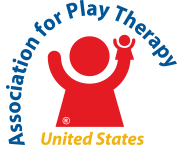|
|
Play Therapists are Mental Health Professionals applying the Therapeutic Power of Play.
"You can discover more about a person in an hour of play than in a year of conversation." — Plato PLEASE NOTE I AM NO LONGER WORKING WITH YOUNG CHILDREN. I AM HAPPY TO PLAY WITH EVERY ADULT'S INNER CHILD AND I OFFER PLAY THERAPY SUPERVISION AND CONSULTATION TO MENTAL HEALTH PROFESSIONALS. |

What is Play Therapy?
Talking may be the most common form of therapy for adults and many teens, however it is not a very effective way to work with children because their brains are not yet developed in a way where they can communicate in such a cognitive manner.
In Play Therapy, toys are like the child’s words and play is the child’s language (Landreth 2002).Play Therapy is a structured child-centered therapy approach which builds on the normal communication and learning processes of children. Play Therapy is typically used with children ages 3-12, but it can also be implemented with teens and adults. Mental Health Professionals apply the therapeutic power of play to help children express their feelings in a symbolic way through play materials when they do not have the verbal language to do so.
In Play Therapy the therapist creates a safe therapeutic environment for the child to explore their issues and be sensitively responded to by an empathetic and non-judgmental therapist. Play Therapy helps children learn to communicate with others, process, understand and express their feelings, develop problem solving skills and improve behavior. Play Therapy allows opportunities for physical, emotional, cognitive development and social growth.
For more information on play therapy, please visit the Association for Play Therapy website www.a4pt.org
Talking may be the most common form of therapy for adults and many teens, however it is not a very effective way to work with children because their brains are not yet developed in a way where they can communicate in such a cognitive manner.
In Play Therapy, toys are like the child’s words and play is the child’s language (Landreth 2002).Play Therapy is a structured child-centered therapy approach which builds on the normal communication and learning processes of children. Play Therapy is typically used with children ages 3-12, but it can also be implemented with teens and adults. Mental Health Professionals apply the therapeutic power of play to help children express their feelings in a symbolic way through play materials when they do not have the verbal language to do so.
In Play Therapy the therapist creates a safe therapeutic environment for the child to explore their issues and be sensitively responded to by an empathetic and non-judgmental therapist. Play Therapy helps children learn to communicate with others, process, understand and express their feelings, develop problem solving skills and improve behavior. Play Therapy allows opportunities for physical, emotional, cognitive development and social growth.
For more information on play therapy, please visit the Association for Play Therapy website www.a4pt.org